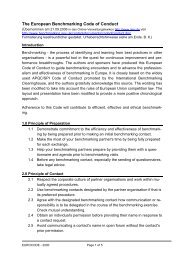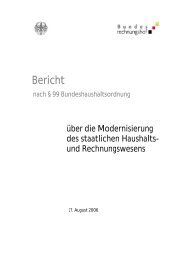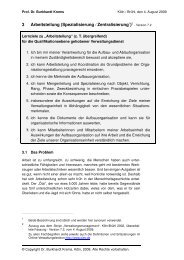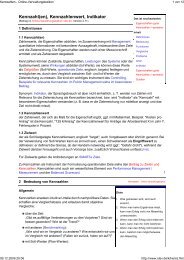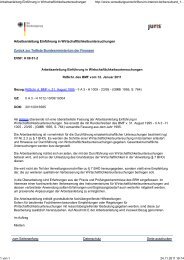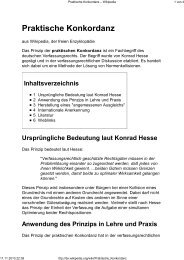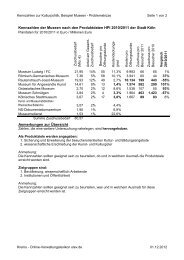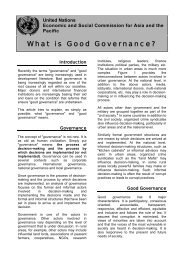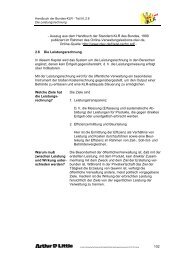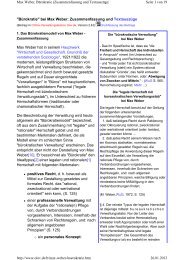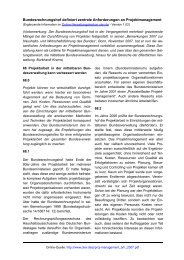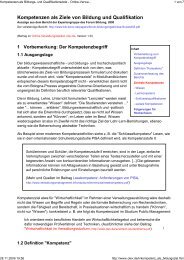Strategy Survival Guide
Strategy Survival Guide
Strategy Survival Guide
Create successful ePaper yourself
Turn your PDF publications into a flip-book with our unique Google optimized e-Paper software.
<strong>Strategy</strong> <strong>Survival</strong> <strong>Guide</strong> Version 2.1<br />
Prime Minister’s <strong>Strategy</strong> Unit<br />
home | strategy development | strategy skills | site index<br />
<strong>Strategy</strong> Skills<br />
> Building an Evidence Base<br />
Learning from others - International comparisons<br />
> in practice<br />
International comparisons bring together information, data and analysis on approaches to tackling similar<br />
policy areas in other countries and draw out relevant experience that may be applied in the UK. They can be<br />
one of the only real ways of comparing effectiveness of different strategies aimed at the same or similar<br />
problems (if in different institutional and cultural contexts). Benchmarking of different countries can also<br />
provide pointers to how to improve UK performance across a wide range of issues – by pointing to countries<br />
which are leading the field (identifying positive deviance from the norm).<br />
Often conducted as a stand-alone piece of work, the output is usually a written report but could also be a<br />
presentation or seminar. It can also feed into the overall project report.<br />
The Process<br />
1. Identify problem or challenge<br />
In the early stages of analysis, it is often helpful to define the problem being considered fairly flexibly or<br />
broadly and without couching it in institution-specific terms that might inhibit cross-national comparison. Once<br />
potential comparator countries have been identified, it will be possible to focus on the particular issues where<br />
international comparisons might be most instructive. The key questions to be addressed and the information<br />
to be acquired from an international mapping exercise should be carefully defined. A pro forma can be a<br />
helpful tool, particularly to guide web-based searches.<br />
2. Identify comparator country/region<br />
It is often useful to survey a wide variety of countries to see which might be the best 'fit’. The ideal<br />
comparator is one where there is a similar policy environment i.e. where the issues faced are closely<br />
comparable, and also where the two countries are similar in cultural and socio-economic respects. Of<br />
course, two policy environments will never be identical, and it is a matter of judgement as to the extent to<br />
which differences in ideological, resource and institutional factors at either the macro or micro level impact on<br />
the ability to make worthwhile comparisons.<br />
3. Gather relevant evidence<br />
In gathering evidence to inform cross-border learning, it is advisable to consult as wide a range of relevant<br />
sources as possible. From a distance, it can be difficult to map out the inter-relationships between different<br />
stakeholders, and determine the significance of different elements of the institutional landscape. Gaining a<br />
wide variety of perspectives on an issue helps to fill in essential contextual information and provide a more<br />
rounded understanding.<br />
In gathering relevant evidence, a key decision is whether to visit the country in question or to collect<br />
information at a distance. If you are planning to conduct country visits, sufficient time and budget should be<br />
allocated in the project management plan. For distance data gathering, the internet is of course the most<br />
useful resource, in addition to telephone calls, correspondence and video conferencing.<br />
Consider meeting, or corresponding with, the following: policy-makers/decision-makers; programme<br />
sponsors, managers, staff and other stakeholders (where a specific government programme or policy is<br />
being considered); target participants; evaluation and research/academic community, and representatives<br />
from the media.<br />
Other sources of information include international bodies (e.g. European Commission, OECD, UN, World<br />
Bank, IMF) and Universities which have comparative research expertise in the area in question.<br />
<strong>Strategy</strong> <strong>Survival</strong> <strong>Guide</strong> – <strong>Strategy</strong> Skills<br />
Page 146



